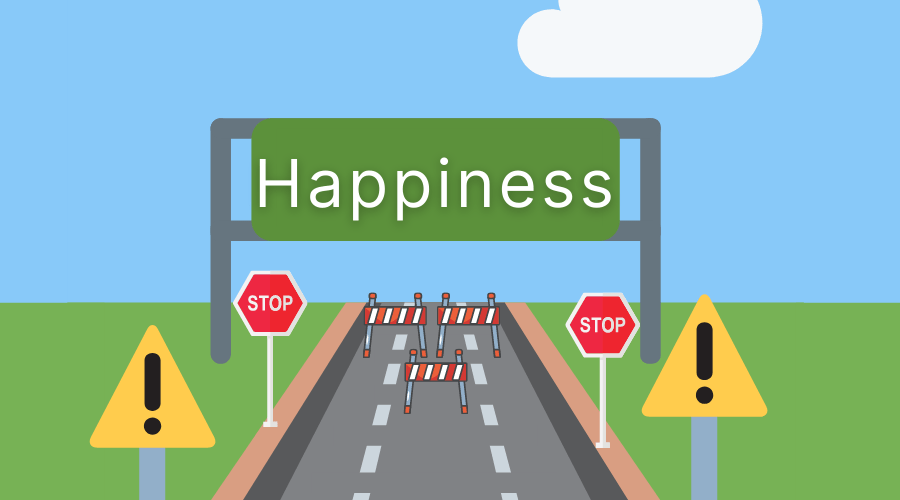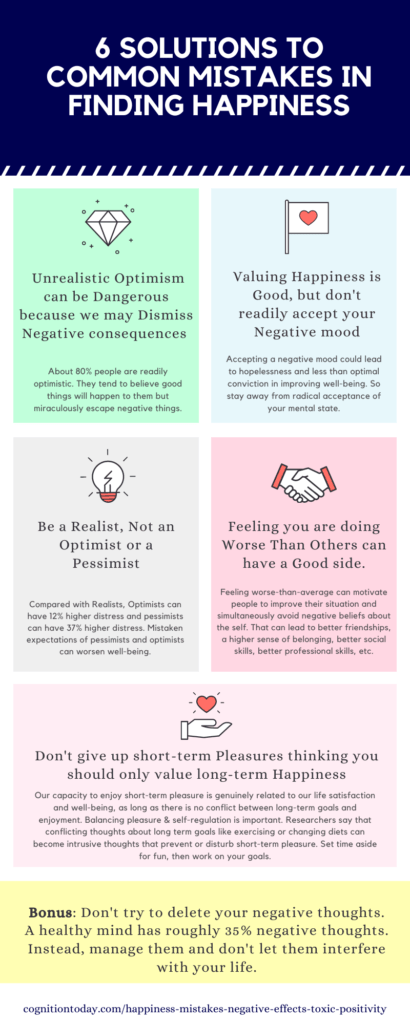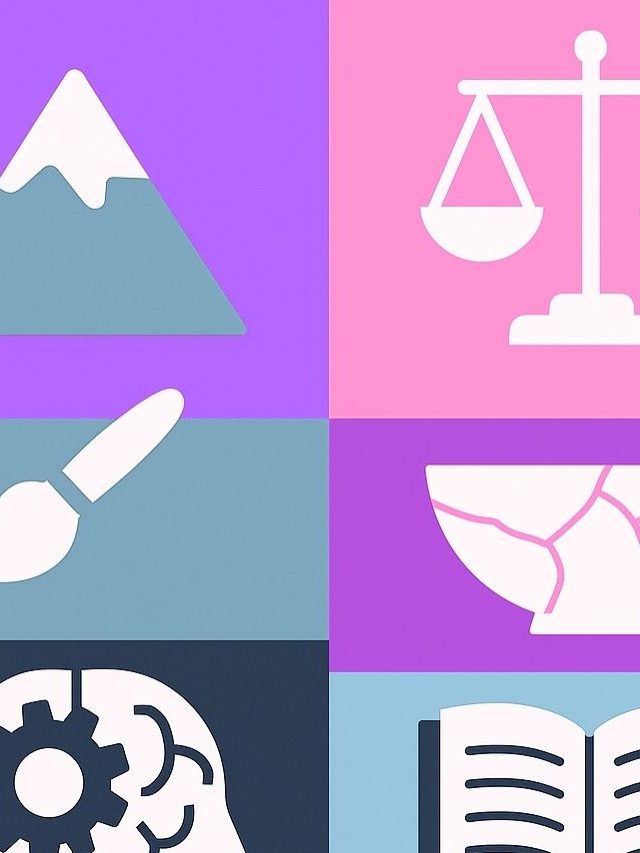While trying to find happiness, many lose motivation because they keep trying and failing. The act of finding happiness itself leads to unhappiness by reminding us of our unpleasant state. Instead, focusing on simple holistic well-being will automatically improve happiness.
There is a huge downside to being positive and happy that people don’t always acknowledge. And, there are bad ways to be happy. It could be because we tend to overvalue happiness in this new-age positivity zeitgeist. Let’s look at the downside of positivity and the negative effects of happiness that research has documented. Is there a way to avoid toxic positivity? Research says yes. #nopositivevibesplease
- Toxic Positivity: Too much happiness can be bad
-
6 Mistakes People Make in Finding Happiness that Make them Unhappy and Create Toxic Positivity
- 1. Trying hard to be overly optimistic about everything
- 2. Being unrealistic about future events
- 3. Overvaluing happiness and readily accepting your negative state
- 4. Trying to be better than others in the wellness game
- 5. Giving up short-term pleasures and exerting too much self-control/self-denial
- 6. Suppressing negative thoughts and forcing positive thoughts on yourself
- 4 Limits of Happiness
- Sources
Toxic Positivity: Too much happiness can be bad
Toxic positivity is the harmful side of chasing conventionally positive mental states like happiness by giving too much importance to positivity all the time. It’s the unrealistic idea that positivity should be the guiding principle for well-being and one must be positive or happy to feel they are winning in life. It also comes with an obsession with seeking happiness, denying or shaming negative thoughts/behaviors, achieving perfect wellness, constant healing, positive thoughts, and positive perspectives which denies people the realistic aspects of life – negative and neutral experiences, good and bad behavior, and good and bad thoughts. Toxic positivity doesn’t talk about when happiness is bad and when the obsession with happiness has a darker side. It limits reality to only include the positive bits. You can have a toxic positive outlook or others may impose it on you.
Pursuing well-being is tricky because many tend to focus on the individual, not collective harmony. The search for happiness could itself be the cause of unhappiness via at least 4 mechanisms[1]: Dissatisfaction after failing to find happiness, overly optimizing life, self-blame for pitfalls or a bad mood, and comparing with others to compete in the wellness game. To overcome these problems, we need a holistic approach to well-being that focuses on meaning & purpose, health, instant pleasure, social connectedness, coping with negativity, and reconnecting with forgotten beauty like art & nature. You can follow these evidence-based holistic tips; they will seem like common sense tips, and they are.
Let us now look at some wrong ways in which we approach our happiness. These mistakes lead to toxic positivity.
6 Mistakes People Make in Finding Happiness that Make them Unhappy and Create Toxic Positivity

1. Trying hard to be overly optimistic about everything
- Mistake: Trying to be more optimistic to find happiness.
- Tip: Restrict your tendency to be overly optimistic.
About 80% of people[2] have an optimism bias which means they overestimate the likelihood of positive things and underestimate the likelihood of negative things. They feel good things will happen to them in the future and miraculously escape negative things. The optimism bias occurs in future relationships, job prospects, health, money, success, etc.
Excessive optimism has a downside. It could promote unhealthy behavior because optimism leads to dismissing negative consequences. Optimists could fall into the trap of binge-eating, smoking, excessive expenditure, etc. which have significant negative effects on health. Too much optimism could push a person to favor short-term rewards at the cost of long-term well-being.
2. Being unrealistic about future events
- Mistake: Wishing for good things is a positive philosophy.
- Tip: Be realistic; optimism & pessimism can disappoint.
Realists have higher well-being[3] than optimists and pessimists. Compared with Realists, Optimists can have 12% higher distress and Pessimists can have 37% higher distress. Mistaken expectations of pessimists and optimists can worsen well-being.
Overly optimistic people can unreasonably expect good things to happen and then get disappointed or dissatisfied when the best doesn’t happen. Overly pessimistic people can have a dominant feeling of doom & disappointment even when the worst doesn’t happen. Pessimistic & optimistic planning may also have worse outcomes than realistic planning.
3. Overvaluing happiness and readily accepting your negative state
- Mistake: People place too much importance on finding happiness.
- Tip: Give happiness moderate importance and be ready to shift from self-acceptance to self-rejection.
Pursuing happiness or valuing happiness appears like a lifelong desire for many people and there have been mixed conclusions from scientists about how it affects their well-being. Within a collectivistic culture, people who value happiness a lot[4] seem to have higher well-being, especially if they do not readily accept their current negative experiences or negative moods. The benefits of valuing happiness may not be present in an individualistic culture. One study[5] shows valuing happiness can be a risk factor for depression. Probably because it may lead to a stark contrast between loneliness and a deep-seated desire to be happy. The contrast creates disappointment. Individualistic and collectivistic cultures differ a lot regarding identity and self-image, so it plays a role. It’s easier to feel connected to others and value that social connection dearly in a collectivistic society. A truly individualistic living could set you up for loneliness.
For those who accept their negative internal mental state, the effect of valuing happiness on well-being is weak. Possibly because when we accept negative mental states as our own, we learn to live with negative moods, experiences, thoughts, attitudes, conflicts, and biases. This could create a feeling that negative states are unchangeable, even when healthy coping mechanisms can improve life satisfaction. However, research also says that accepting negative feelings as just negative feelings (without judging yourself) reduces the amount of attention we pay to negative feelings. This isn’t contradicting the previous research. Accepting negative emotions as “temporary” feelings and then rejecting them as your “permanent” feeling is a good approach.
4. Trying to be better than others in the wellness game
- Mistake: Comparing & competing in the wellness game to be a winner.
- Tip: Accept being worse off than others; it sets you up for more satisfaction in the future.
One reason why people would get desperate to have a happier, more satisfying life could be feeling they are doing worse than others in terms of salary, happiness, life satisfaction, achievement, etc. In psychology, that’s called “social comparison leading to worse-than-average beliefs[6].” With the modern zeitgeist of positivity and wellness, there could be social pressure to feel satisfied with oneself and put well-being on a pedestal. So people could feel the pressure to feel better-than-average all the time, quickly. However, feeling worse than average actually has a positive side – it promotes well-being in the long term, even though it feels bad immediately.
Feeling worse than average can motivate people to improve their situation and simultaneously avoid negative beliefs about the self. That double impact can lead to many future benefits like better friendships, a higher sense of belonging, better social skills, better professional skills, etc. All because they worked toward improvement without the pressure to be the best. On the other hand, optimistically feeling better-than-average could lead to overconfidence, slacking off, neglect, taking things for granted, etc. The consequences could be losing your advantages or current benefits.
5. Giving up short-term pleasures and exerting too much self-control/self-denial
- Mistake: Giving up instant gratification to “earn” higher well-being.
- Tip: Enjoy instant gratification, but learn to truly enjoy it.
When looking at different philosophies on improving quality of life, there is a common notion that one must forego instant gratification or hedonistic tendencies and learn self-control to earn true happiness or success. While that’s not bad advice, research suggests[7] hedonistic pursuits like relaxing or going out for fun can be just as important as self-control in improving well-being. Our capacity to enjoy short-term pleasures is genuinely related to our life satisfaction and well-being, as long as there is no conflict between long-term goals and enjoyment. Balancing pleasure & self-regulation is important; both can go hand-in-hand. Researchers say that conflicting thoughts about long-term goals like exercising or changing diets can become intrusive thoughts that prevent or disturb short-term pleasure.
For example – knowing you have to apply for a job soon can interfere with your fun enjoyable time on a road trip if you think about work when you really could just enjoy your time. Even if people do seek instant happiness, future goals like learning something new or meeting an important life milestone can hamper their ability to fully enjoy themselves. The capacity to successfully enjoy short-term pleasures is important. Successfully enjoying oneself and successfully pursuing short-term happiness could be a neglected path to better well-being. So go on, relax, and have fun without feeling guilty about not completing long-term goals!
6. Suppressing negative thoughts and forcing positive thoughts on yourself
- Mistake: Trying to delete negative thoughts & think positively.
- Tip: Don’t suppress negative thoughts; they are a part of a healthy mind.
A healthy mind has a good mixture of positive and negative thoughts. One estimate[8] suggests that those with severe mental health issues have an equal amount of positive and negative self-referential thoughts (I am…) and those who are mentally fit have 1.6 positive thoughts for each negative thought. So a healthy internal dialog could be healthy even if 35% of thoughts are negative. Another estimate[9] puts the positive to negative thought ratio at 1.7:1 for functionally healthy people.
Suppressing negative thoughts isn’t a wise choice[10]. When we suppress the outward emotional expression of those thoughts, we compromise our cognitive functioning like decision-making and memory. When negative thoughts are suppressed, they might hog all the mental bandwidth and prevent us from paying attention and prioritizing our adaptation to circumstances. On the other hand, re-appraising negative thoughts that create strong emotions do not compromise our cognitive functioning. Re-appraising means converting and modifying thoughts to mean something different. For example, converting a sense of doom into a problem-solving mindset to overcome difficult hurdles. Keeping your cool or holding back emotional expression[11] can spoil our memory formation during the suppression period and increase physical signs of stress too. This makes self-growth difficult which reinforces the unhappy state. So instead of suppressing negative thoughts, convert them to mean something more positive or useful. Use these cognitive defusion techniques, self-affirmations, or emotional regulation techniques to re-appraise them.
The 6 mistakes listed above are inherently toxic positivity ideas that make finding happiness difficult.
4 Limits of Happiness
Happiness is generally seen as a positive state of mind with desirable effects like feeling a sense of motivation & reward, showing kindness to others, helping others, etc. However, researchers June Gruber, Iris B. Mauss, and Maya Tamir[12] conclude that there is a dark side to happiness. They argue that happiness is not always, in every single context, unconditionally, a positive state of mind. According to their review of research, there are situations where pursuing happiness or feeling happy has negative effects. They categorize the bad side of happiness in 4 ways:
1. There may be wrong intensities of happiness
- A common happiness myth is that more happiness gives you proportional gains. However, researchers argue that happiness benefits us only up to a moderate point and extreme levels of it could be a waste of effort or even cause some damage.
- A moderately positive mood can make us creative, but extremely positive moods could reduce creativity. When people have a high positive to negative emotion ratio (5:1), they tend to have rigid behavior which can interfere with healthily adapting to new circumstances. If we have an extremely positive mood, we may even neglect threats and do risky/harmful activities like binge eating and drugs.
- In disorders like mania or manic depression (shuffling between low mood & extremely energetic mood over weeks), more intense positive emotions typically predict a worse relapse and an even more intense manic state.
- An extremely high level of happiness could also make socializing difficult because it isn’t relatable and a mood mismatch between friends or dating partners could strain the relationships.
2. There may be wrong times to feel happy
- Emotions are context-dependent, and some researchers say that we are naturally motivated to develop emotions that are better suited to a context or a goal. For example, people are readily angrier when a context demands confrontation. In such cases, feeling overly positive can be damaging because it impairs cognitive functioning and motivation to attain a goal. It could even worsen one’s performance in activities where the expected emotion is suppressed in favor of a positive mood. There is an appropriate context for anxiety, sadness, and panic (such as environmental damage). Being happy about it for the sake of it could undermine the urgency that is needed.
- Emotions affect how we pay attention, and positive and negative moods affect how we process that information. An overly positive mood can activate beliefs, broad concepts, and stereotypes in the mind. For example, researchers have found that inducing a positive mood in people makes them judge other people in a more negative way. A negative mood can activate relevant details and process information systematically. For example, inducing a negative mood could make people more persuasive.
- Research suggests that positive emotions are typically associated with a safe environment, and negative emotions are associated with a hostile environment. Experiencing a positive mood in a hostile environment could make people gullible or more prone to losing something. Whereas being in a negative mood in a hostile environment could defend them from a potential loss.
3. There may be wrong ways to pursue happiness
- Many people wish they are happier and that wish may start a cycle of feeling unhappy. When we value happiness a lot, it creates a mismatch between the current emotional state (unhappy) and the desired emotional state (happy). This mismatch makes your current and desired state incompatible because they are both true at any given point in time. Being unhappy while valuing happiness creates dissatisfaction which only increases the importance we give to happiness, again creating disappointment because we are reminded of our unhappiness.
- This paradox between valuing happiness and lower well-being gets worse when we believe it is easier to achieve happiness. When we value happiness a lot and believe it’s very easy to be happy, small setbacks can cause more unhappiness. This is similar to how we could be more disappointed if we fail an easy exam compared to a difficult exam when we value achievement a lot.
- When life is not stressful, and we put happiness on a pedestal, we don’t have many external reasons to blame our unhappiness on. That further worsens our mood because we may choose to blame ourselves for our unhappiness. This pattern of thinking gets worse when a person is already suffering from depression or anxiety.
- We could fall for the soft capitalism (Sarah Atkinson) called wellness technology/market and buy into the premise that we can easily purchase our happiness. Advertisements and social comparisons could set us up to desire wellness even more, but that could only highlight our lack of wellness. That sets us up for disappointment which nudges us to fall for the soft capitalistic pursuit of happiness again. Feeling that this “purchase” is easy makes our disappointment worse when we don’t get the promised happiness from the purchase.
4. There may be wrong types of happiness
- Feeling pride when there isn’t any merit to the reasons behind that pride can have negative consequences like antisocial behavior, aggressiveness, lower likeability, etc. Such pride could make a person happy, but it could potentially harm relationships. At a social level, it could make forming friendships and societies harder and even lead to collective narcissism – the toxic idea that one’s group is inherently superior and entitled to demonstrate superiority over others.
- Different cultures and upbringings create different ways to interpret happiness. Some cultures encourage pride and achievement as a part of happiness. Some cultures encourage social connection and community well-being. Different cultures also value different levels of happiness – ranging from contentment which is a low-arousal emotion to excitement which is a high-arousal emotion. A discrepancy between your ideal low-arousal and actual low-arousal experience in a culture that values low arousal more can cause poor mental health. The same holds true for a discrepancy between ideal high-arousal and actual high arousal experiences in cultures that value high arousal happiness. Aligning personal happiness values with a culture’s happiness values could decrease the likelihood of negative effects of happiness.

Sources
[2]: https://www.sciencedirect.com/science/article/pii/S0960982211011912
[3]: https://journals.sagepub.com/doi/full/10.1177/0146167220934577
[4]: https://onlinelibrary.wiley.com/doi/full/10.1002/pchj.319
[5]: https://guilfordjournals.com/doi/abs/10.1521/jscp.2014.33.10.890
[6]: https://www.frontiersin.org/articles/10.3389/fpsyg.2020.00642/full
[7]: https://journals.sagepub.com/doi/10.1177/0146167220941998
[8]: https://link.springer.com/article/10.1007/BF01176069
[9]: https://www.researchgate.net/publication/226389616_The_internal_dialogue_On_the_asymmetry_between_positive_and_negative_coping_thoughts
[10]: https://journals.sagepub.com/doi/10.1111/j.0963-7214.2004.00291.x?icid=int.sj-challenge-page.similar-articles.2
[11]: https://journals.sagepub.com/doi/10.1177/01461672992511010
[12]: https://journals.sagepub.com/doi/abs/10.1177/1745691611406927

Hey! Thank you for reading; hope you enjoyed the article. I run Cognition Today to capture some of the most fascinating mechanisms that guide our lives. My content here is referenced and featured in NY Times, Forbes, CNET, and Entrepreneur, and many other books & research papers.
I’m am a psychology SME consultant in EdTech with a focus on AI cognition and Behavioral Engineering. I’m affiliated to myelin, an EdTech company in India as well.
I’ve studied at NIMHANS Bangalore (positive psychology), Savitribai Phule Pune University (clinical psychology), Fergusson College (BA psych), and affiliated with IIM Ahmedabad (marketing psychology). I’m currently studying Korean at Seoul National University.
I’m based in Pune, India but living in Seoul, S. Korea. Love Sci-fi, horror media; Love rock, metal, synthwave, and K-pop music; can’t whistle; can play 2 guitars at a time.



























